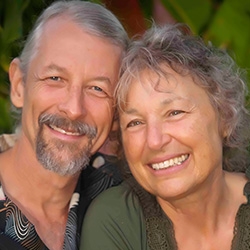

Search Results: process
-
This telecourse recording provides an experience with the language, skills and consciousness of NVC applied to mediating all types of conflict whether you are one of the people in conflict or you are supporting others in conflict.
-
Join CNVC Certified Trainers and Mediators Jori and Jim Manske in an exploration of using Nonviolent Communication in the context of Mediation and Conflict Resolution.
-
Trainer Tip: Taking time to mourn our regrets and unmet needs can lead to a deeper self-connection and feelings of peace.
-
Trainer Tip: Q: How do we get the love we want? A: Ask for it.
-
Last year, I planted my vegetable garden in February. It was an enormous amount of work to get it ready. This year, we decided to move the garden farther away from trees (to avoid the ongoing tree root issue and allow more sun). So, we created 4 new beds. Now, they are ready to be planted, and yet… forward momentum has stalled.
-
One of the most important things you can do to live a meaningful and rewarding life filled with vitality is reclaim your emotions. Eric offers a tip to reclaim your emotions, rescuing you from the numb and deadening state of “fine."
-
Enjoy listening in as Arnina assists participants in fine tuning what they wish for their futures, and what practices they intend to embrace as the course winds down. She also offers strategies for what they can do if they forget their intended practice, and revisits the importance of untangling Needs from Core Belief.
-
Miki will take you step-by-step through four vital systems that support radical collaboration and foster meaning. You’ll learn how to design a decision making process, create clear statements of intent, and create a process for resolving conflict.
-
Bridget Belgrave visually demonstrates core NVC principles with needs at the center of the process.
-
Trainer Tip: When there's conflict if you set the intention to connect and build trust first, you're more likely to move towards resolution. This can be built through offering reflections that captures essence of what's important to each party. Once connection and trust is established, then begin the process of creating strategies and solutions.
-
Trainer Tip: What are your goals, hopes and dreams? For greater success it’s important to make your goals concrete, specific, and focused on what do you want (rather than what you don't want).
-
Here's a practice for cultivating more awareness of our thinking and choices, when our feelings and thoughts become stimulated.
-
Trainer tip: Empathy can offer profound learning opportunities to children, expand their feelings and needs vocabulary, and teach them the positive results of valuing everyone’s needs. Read on for a story that illustrates this.
-
Trainer Tip: Practicing NVC in situations that are not emotionally charged can give you valuable practice to help you maintain a compassionate consciousness when circumstances are charged. It can help you stay in that consciousness for a longer period of time. You can also practice by naming the needs that you got met in the situations you enjoy.
-
- Celebrate and nurture your relationship to the Earth — and each other!
- Explore your connections to family, partner, work, nature, self and more
- Discover new ways to grow in community and work together to make this world a better place
- Engage and immerse yourself in NVC while making new friends!
-
Join CNVC Certified Trainer Jerry Koch-Gonzalez, Greg Rouillard and Certified Dynamic Governance (Sociocracy) Consultant John Buck for this six-session course recording to learn how to transform your method of meeting facilitation. Many NVC organizations have begun using sociocratic tools, including circle meetings and decision making by consent, with satisfying results.
-
Trainer Tip: Meetings can be unproductive when the participants aren’t clear about their needs or what they want from the group. When participants express opinions without expressing a need or informing the group of what they want, the meeting lacks clarity. Instead, if we can focus on naming our needs and make related requests, we can get closer to resolution much faster and enjoy the process more. Read on for an example.
-
Some things may seem to take longer at first, but end up making things easier and faster. Other things seem easier or faster in the short term, but end up taking more time in the long run. This applies to projects, group agreements about process, relationships, addressing conflicts, clearing up misunderstandings, damage control, etc. It can be faster to slow down, be more present, and take the time since we care about the outcome.
-
- Learn your body’s “language” and how to listen deeply to it
- Expand your NVC toolbox with emergency self-empathy tips
- Explore drawing on your senses to get past what is blocking you
- Discover and practice that “missing step” in the NVC process
-
Trainer Tip: Sometimes our actions keep us from meeting our needs. Let’s say you long for connection with others, but you are also afraid of it, so you push people away. Then you tell yourself that no one likes you, resulting in depression and self-criticism. Self-empathy can help clarify what we truly want rather than focusing on what is wrong with others or ourselves, and help us align in ways more likely to meet our needs.

Quick Links
Subscription Preferences
Stay In Touch!
Looking for ways to keep up with NVC Academy news, get special offers, free resources, or words of inspiration? Here are five ways to stay engaged:




















